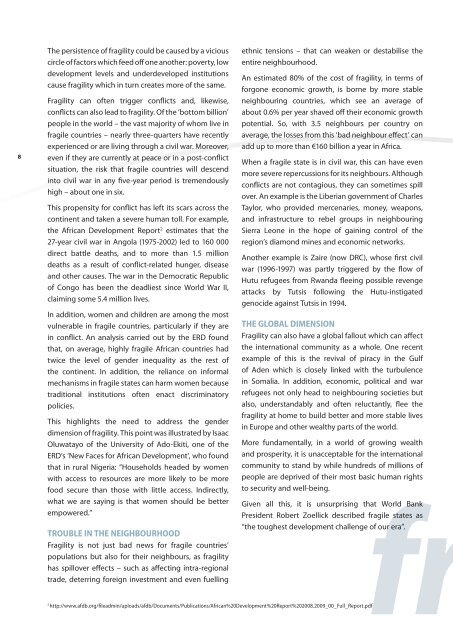overcoming fragility in africa - European Report on Development
overcoming fragility in africa - European Report on Development
overcoming fragility in africa - European Report on Development
Create successful ePaper yourself
Turn your PDF publications into a flip-book with our unique Google optimized e-Paper software.
8<br />
The persistence of <str<strong>on</strong>g>fragility</str<strong>on</strong>g> could be caused by a vicious<br />
circle of factors which feed off <strong>on</strong>e another: poverty, low<br />
development levels and underdeveloped <str<strong>on</strong>g>in</str<strong>on</strong>g>stituti<strong>on</strong>s<br />
cause <str<strong>on</strong>g>fragility</str<strong>on</strong>g> which <str<strong>on</strong>g>in</str<strong>on</strong>g> turn creates more of the same.<br />
Fragility can often trigger c<strong>on</strong>flicts and, likewise,<br />
c<strong>on</strong>flicts can also lead to <str<strong>on</strong>g>fragility</str<strong>on</strong>g>. Of the ‘bottom billi<strong>on</strong>’<br />
people <str<strong>on</strong>g>in</str<strong>on</strong>g> the world – the vast majority of whom live <str<strong>on</strong>g>in</str<strong>on</strong>g><br />
fragile countries – nearly three-quarters have recently<br />
experienced or are liv<str<strong>on</strong>g>in</str<strong>on</strong>g>g through a civil war. Moreover,<br />
even if they are currently at peace or <str<strong>on</strong>g>in</str<strong>on</strong>g> a post-c<strong>on</strong>flict<br />
situati<strong>on</strong>, the risk that fragile countries will descend<br />
<str<strong>on</strong>g>in</str<strong>on</strong>g>to civil war <str<strong>on</strong>g>in</str<strong>on</strong>g> any five-year period is tremendously<br />
high – about <strong>on</strong>e <str<strong>on</strong>g>in</str<strong>on</strong>g> six.<br />
This propensity for c<strong>on</strong>flict has left its scars across the<br />
c<strong>on</strong>t<str<strong>on</strong>g>in</str<strong>on</strong>g>ent and taken a severe human toll. For example,<br />
the African <strong>Development</strong> <str<strong>on</strong>g>Report</str<strong>on</strong>g> 2 estimates that the<br />
27-year civil war <str<strong>on</strong>g>in</str<strong>on</strong>g> Angola (1975-2002) led to 160 000<br />
direct battle deaths, and to more than 1.5 milli<strong>on</strong><br />
deaths as a result of c<strong>on</strong>flict-related hunger, disease<br />
and other causes. The war <str<strong>on</strong>g>in</str<strong>on</strong>g> the Democratic Republic<br />
of C<strong>on</strong>go has been the deadliest s<str<strong>on</strong>g>in</str<strong>on</strong>g>ce World War II,<br />
claim<str<strong>on</strong>g>in</str<strong>on</strong>g>g some 5.4 milli<strong>on</strong> lives.<br />
In additi<strong>on</strong>, women and children are am<strong>on</strong>g the most<br />
vulnerable <str<strong>on</strong>g>in</str<strong>on</strong>g> fragile countries, particularly if they are<br />
<str<strong>on</strong>g>in</str<strong>on</strong>g> c<strong>on</strong>flict. An analysis carried out by the ERD found<br />
that, <strong>on</strong> average, highly fragile African countries had<br />
twice the level of gender <str<strong>on</strong>g>in</str<strong>on</strong>g>equality as the rest of<br />
the c<strong>on</strong>t<str<strong>on</strong>g>in</str<strong>on</strong>g>ent. In additi<strong>on</strong>, the reliance <strong>on</strong> <str<strong>on</strong>g>in</str<strong>on</strong>g>formal<br />
mechanisms <str<strong>on</strong>g>in</str<strong>on</strong>g> fragile states can harm women because<br />
traditi<strong>on</strong>al <str<strong>on</strong>g>in</str<strong>on</strong>g>stituti<strong>on</strong>s often enact discrim<str<strong>on</strong>g>in</str<strong>on</strong>g>atory<br />
policies.<br />
This highlights the need to address the gender<br />
dimensi<strong>on</strong> of <str<strong>on</strong>g>fragility</str<strong>on</strong>g>. This po<str<strong>on</strong>g>in</str<strong>on</strong>g>t was illustrated by Isaac<br />
Oluwatayo of the University of Ado-Ekiti, <strong>on</strong>e of the<br />
ERD’s ‘New Faces for African <strong>Development</strong>’, who found<br />
that <str<strong>on</strong>g>in</str<strong>on</strong>g> rural Nigeria: “Households headed by women<br />
with access to resources are more likely to be more<br />
food secure than those with little access. Indirectly,<br />
what we are say<str<strong>on</strong>g>in</str<strong>on</strong>g>g is that women should be better<br />
empowered.”<br />
fr<br />
2<br />
http://www.afdb.org/fileadm<str<strong>on</strong>g>in</str<strong>on</strong>g>/uploads/afdb/Documents/Publicati<strong>on</strong>s/African%20<strong>Development</strong>%20<str<strong>on</strong>g>Report</str<strong>on</strong>g>%202008.2009_00_Full_<str<strong>on</strong>g>Report</str<strong>on</strong>g>.pdf<br />
TROUBLE IN THE NEIGHBOURHOOD<br />
Fragility is not just bad news for fragile countries’<br />
populati<strong>on</strong>s but also for their neighbours, as <str<strong>on</strong>g>fragility</str<strong>on</strong>g><br />
has spillover effects – such as affect<str<strong>on</strong>g>in</str<strong>on</strong>g>g <str<strong>on</strong>g>in</str<strong>on</strong>g>tra-regi<strong>on</strong>al<br />
trade, deterr<str<strong>on</strong>g>in</str<strong>on</strong>g>g foreign <str<strong>on</strong>g>in</str<strong>on</strong>g>vestment and even fuell<str<strong>on</strong>g>in</str<strong>on</strong>g>g<br />
ethnic tensi<strong>on</strong>s – that can weaken or destabilise the<br />
entire neighbourhood.<br />
An estimated 80% of the cost of <str<strong>on</strong>g>fragility</str<strong>on</strong>g>, <str<strong>on</strong>g>in</str<strong>on</strong>g> terms of<br />
forg<strong>on</strong>e ec<strong>on</strong>omic growth, is borne by more stable<br />
neighbour<str<strong>on</strong>g>in</str<strong>on</strong>g>g countries, which see an average of<br />
about 0.6% per year shaved off their ec<strong>on</strong>omic growth<br />
potential. So, with 3.5 neighbours per country <strong>on</strong><br />
average, the losses from this ‘bad neighbour effect’ can<br />
add up to<br />
more than €160 billi<strong>on</strong> a year <str<strong>on</strong>g>in</str<strong>on</strong>g> Africa.<br />
When a fragile state is <str<strong>on</strong>g>in</str<strong>on</strong>g> civil war, this can have even<br />
more severe repercussi<strong>on</strong>s for its neighbours. Although<br />
c<strong>on</strong>flicts are not c<strong>on</strong>tagious, they can sometimes spill<br />
over. An example is the Liberian government of Charles<br />
Taylor, who provided mercenaries, m<strong>on</strong>ey, weap<strong>on</strong>s,<br />
and <str<strong>on</strong>g>in</str<strong>on</strong>g>frastructure to rebel groups <str<strong>on</strong>g>in</str<strong>on</strong>g> neighbour<str<strong>on</strong>g>in</str<strong>on</strong>g>g<br />
Sierra Le<strong>on</strong>e <str<strong>on</strong>g>in</str<strong>on</strong>g> the hope of ga<str<strong>on</strong>g>in</str<strong>on</strong>g><str<strong>on</strong>g>in</str<strong>on</strong>g>g c<strong>on</strong>trol of the<br />
regi<strong>on</strong>’s diam<strong>on</strong>d m<str<strong>on</strong>g>in</str<strong>on</strong>g>es and ec<strong>on</strong>omic networks.<br />
Another example is Zaire (now DRC), whose first civil<br />
war (1996-1997) was partly triggered by the flow of<br />
Hutu refugees from Rwanda flee<str<strong>on</strong>g>in</str<strong>on</strong>g>g possible revenge<br />
attacks by Tutsis follow<str<strong>on</strong>g>in</str<strong>on</strong>g>g the Hutu-<str<strong>on</strong>g>in</str<strong>on</strong>g>stigated<br />
genocide aga<str<strong>on</strong>g>in</str<strong>on</strong>g>st Tutsis <str<strong>on</strong>g>in</str<strong>on</strong>g> 1994.<br />
THE GLOBAL DIMENSION<br />
Fragility can also have a global fallout which can affect<br />
the <str<strong>on</strong>g>in</str<strong>on</strong>g>ternati<strong>on</strong>al community as a whole. One recent<br />
example of this is the revival of piracy <str<strong>on</strong>g>in</str<strong>on</strong>g> the Gulf<br />
of Aden which is closely l<str<strong>on</strong>g>in</str<strong>on</strong>g>ked with the turbulence<br />
<str<strong>on</strong>g>in</str<strong>on</strong>g> Somalia. In additi<strong>on</strong>, ec<strong>on</strong>omic, political and war<br />
refugees not <strong>on</strong>ly head to neighbour<str<strong>on</strong>g>in</str<strong>on</strong>g>g societies but<br />
also, understandably and often reluctantly, flee the<br />
<str<strong>on</strong>g>fragility</str<strong>on</strong>g> at home to build better and more stable lives<br />
<str<strong>on</strong>g>in</str<strong>on</strong>g> Europe and other wealthy parts of the world.<br />
More fundamentally, <str<strong>on</strong>g>in</str<strong>on</strong>g> a world of grow<str<strong>on</strong>g>in</str<strong>on</strong>g>g wealth<br />
and prosperity, it is unacceptable for the <str<strong>on</strong>g>in</str<strong>on</strong>g>ternati<strong>on</strong>al<br />
community to stand by while hundreds of milli<strong>on</strong>s of<br />
people are deprived of their most basic human rights<br />
to security and well-be<str<strong>on</strong>g>in</str<strong>on</strong>g>g.<br />
Given all this, it is unsurpris<str<strong>on</strong>g>in</str<strong>on</strong>g>g that World Bank<br />
President Robert Zoellick described fragile states as<br />
“the toughest development challenge of our era”.
















